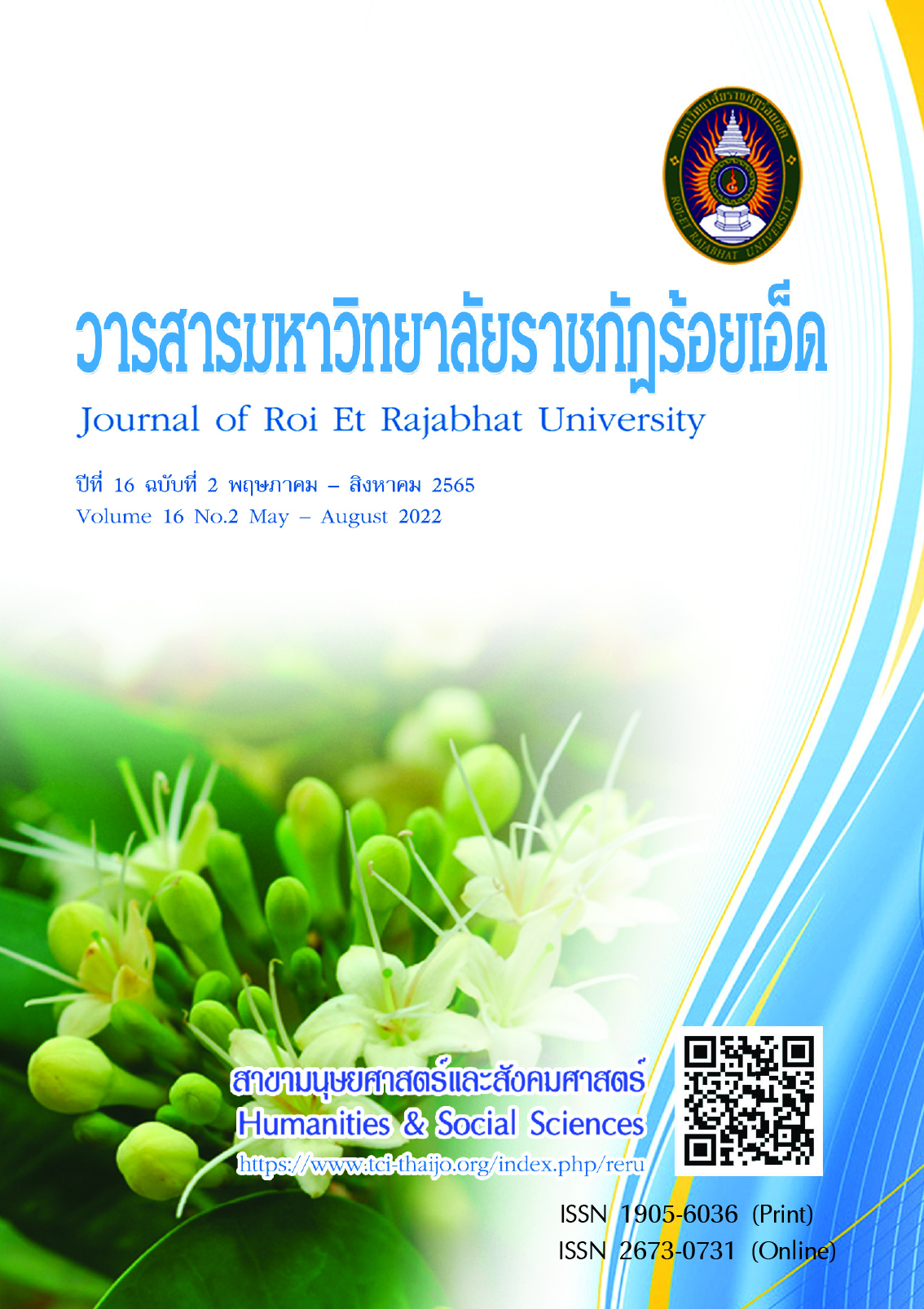The Development of Inquiry (7E) Learning Activities with Science Games to Enhance Academic Achievement in Physics 2 Course for Grade 10 Students at Phonthongpattana Wittaya School
Keywords:
7E inquiry, Science games, Learning AchievementAbstract
The objectives of this research were 1) to study the effectiveness of inquiry (7E) with science games learning management according to the criterion of 75/75 and 2) to compare the learning achievement between before and after using inquiry (7E) learning activities with science games. The samples consisted of 44 grade 10 students in Phonthongpattana Wittaya School, which obtained by purposive sampling technique. The research tools used in this study were 1) physics learning management plans using inquiry (7E) learning activities with science games for 6 plans and 12 hours. And 2) an achievement test on the topic
of Mechanical equilibrium, consisted of 40 items and classified into 35 items of multiple choices and 5 items of subjective test. The one group pre-test and post-test design was used as pre-experimental design.
Data were analyzed using basic statistics, and Wilcoxon signed rank test.
The results showed that a learning management using inquiry (7E) learning activities with science games, mechanical equilibrium had an efficiency of 89.17/76.08 with higher than the establishment criterion. Moreover, the students had a statistically significant of higher posttest than pretest at .05 level.
References
กระทรวงศึกษาธิการ. (2560). กลุ่มสาระการเรียนรู้วิทยาศาสตร์ ฉบับปรับปรุง พ.ศ. 2560. กรุงเทพฯ: โรงพิมพ์ชุมนุมสหกรณ์การเกษตรแห่งประเทศไทย จำกัด.
กระทรวงศึกษาธิการ. (2560). ตัวชี้วัดและสาระการเรียนรู้แกนกลางกลุ่มสาระการเรียนรู้วิทยาศาสตร์ตามหลักสูตรการศึกษาขั้นพื้นฐานพุทธศักราช 2551 (ฉบับปรับปรุง พ.ศ. 2560). กรุงเทพฯ: โรงพิมพ์ชุมชนสหกรณ์การเกษตรแห่งประเทศไทย จำกัด.
กลุ่มสารสนเทศกระทรวงศึกษาธิการ. (2560). ผลสัมฤทธิ์ทางการเรียนในรายวิชาฟิสิกส์. สืบค้นเมื่อ 25 พฤศจิกายน 2563, จาก https://sgs.bopp-obec.info/โรงเรียนโพนทองพัฒนาวิทยา
กลุ่มสารสนเทศกระทรวงศึกษาธิการ. (2561). ผลสัมฤทธิ์ทางการเรียนในรายวิชาฟิสิกส์. สืบค้นเมื่อ 25 พฤศจิกายน 2563, จาก https://sgs.bopp-obec.info/โรงเรียนโพนทองพัฒนาวิทยา
กลุ่มสารสนเทศกระทรวงศึกษาธิการ. (2562). ผลสัมฤทธิ์ทางการเรียนในรายวิชาฟิสิกส์. สืบค้นเมื่อ 25 พฤศจิกายน 2563, จาก https://sgs.bopp-obec.info/โรงเรียนโพนทองพัฒนาวิทยา
ขวัญพัฒน์ ไกรศรีทุม. (2559). ผลการจัดการเรียนรู้ด้วยเกมวิทยาศาสตร์ เรื่องแรงและการเคลื่อนที่ที่มีต่อผลสัมฤทธิ์ทางการเรียนวิชาวิทยาศาสตร์ของนักเรียนชั้นประถมศึกษาปีที่ 3 โรงเรียนบ้านผาซ่อนโชคชัย จังหวัดหนองบัวลำภู. วิทยานิพนธ์ ศึกษาศาสตรมหาบัณฑิต สาขาวิชาหลักสูตรและการสอน. นนทบุรี: มหาวิทยาลับสุโขทัยธรรมาธิราช.
ชินตา สุภาชาติ. (2558). การพัฒนากิจกรรมการเรียนการสอนวิชาฟิสิกส์โดยใช้รูปแบบการสอนแบบสืบเสาะหาความรู้ตามวงจรการเรียนรู้ 7 ขั้นตอน (7E) เรื่องแรงและกฎการเคลื่อนที่ ชั้นมัธยมศึกษาปีที่ 4. วิทยานิพนธ์ ครุศาสตรมหาบัณฑิต สาขาวิชาหลักสูตรและการสอน. สกลนคร: มหาวิทยาลัยราชภัฏสกลนคร.
ช่อผกา สุขุมทอง (2563). การพัฒนาชุดกิจกรรมการเรียนรู้แบบสืบเสาะหาความรู้ (5E) ร่วมกับเกมวิทยาศาสตร์ เรื่องการเปลี่ยนแปลงของโลกระดับประถมศึกษา. วิทยานิพนธ์ วิทยาศาสตรมหาบัณฑิต สาขาวิชาวิทยาศาสตร์ศึกษา. สงขลา: มหาวิทยาลัยทักษิณ.
ทรงศรี สรณสถาพร. (2560). ผลสัมฤทธิ์ของการใช้เกมโมเมนต์ความเฉื่อยของนักเรียนระดับชั้นมัธยมศึกษาปีที่ 4. TSJLD, 1(1), 141-157.
นฤมล โสรสาน. (2560). การเปรียบเทียบผลสัมฤทธิ์ทางการเรียนวิชาชีววิทยา การคิดอย่างมีวิจารณญาณและเจตคติต่อวิชาวิทยาศาสตร์ นักเรียนชั้นมัธยมศึกษาปีที่ 4 ระหว่างการจัดการเรียนรู้โดยใช้ปัญหาเป็นฐาน และการจัดการเรียนรู้แบบสืบเสาะหาความรู้ 7 ขั้น. วิทยานิพนธ์ การศึกษามหาบัณฑิต สาขาวิชาหลักสูตรและการสอน. มหาสารคาม: มหาวิทยาลัยมหาสารคาม.
พันธ์ ทองชุมนุม. (2547). การสอนวิทยาศาสตร์ระดับประถมศึกษา. กรุงเทพฯ: โอเดียนสโตร์.
วิจารณ์ พานิช. (2556). การเรียนรู้เกิดขึ้นอย่างไร. กรุงเทพฯ: เอส.อาร์ พริ้นติ้ง แมสโปรดักส์.
สุกสาคอน สุลิวง และปริญา ปริพุฒ (2562). การพัฒนาชุดกิจกรรมการเรียนรู้ตามแนวคิดการสอนแบบสืบเสาะหาความรู้ กลุ่มสาระการเรียนรู้คณิตศาสตร์ สำหรับนักเรียนชั้นมัธยมศึกษาปีที่ 2 ในโรงเรียนสังกัดแผนกศึกษาธิการและกีฬา แขวงจำปาสัก สาธารณรัฐประชาธิปไตยประชาชนลาว. วารสารมหาวิทยาลัยราชภัฏร้อยเอ็ด, 13(3), 68-76.
American Association for the Advancement of Science. (1970). Science a Process Approach Commentary for Teacher. Washington D.C.: AAAS.
Eisenkraft, A. (2003). Expanding the 5E Model: A Proposed 7E Model Emphasizes Transferring Learning and the Importance of Eliciting Prior Understanding. The Science Teacher, 70(6), 56-59.
National Research Council. (1996). National science education standards. Washington DC: National Academic. The Institute for the Promotion of Teaching Science and Technology (IPST). (2011). PISA Thailand. Bangkok: The Institute for the Promotion of Teaching Science and Technology.
Abell, S. K. (2002). Trends and Issues in Science Education: Research Policy and Practice in Teaching Science as Inquiry.
Downloads
Published
How to Cite
Issue
Section
License
Copyright (c) 2022 Roi Et Rajabhat University

This work is licensed under a Creative Commons Attribution-NonCommercial-NoDerivatives 4.0 International License.
บทความที่ได้รับการตีพิมพ์เป็นลิขสิทธิ์ของวารสารมหาวิทยาลัยราชภัฎร้อยเอ็ด
ข้อความที่ปรากฏในบทความแต่ละเรื่องในวารสารวิชาการเล่มนี้เป็นความคิดเห็นส่วนตัวของผู้เขียนแต่ละท่านไม่เกี่ยวข้องกับมหาวิทยาลัยราชภัฎร้อยเอ็ด และคณาจารย์ท่านอื่นๆในมหาวิทยาลัยฯ แต่อย่างใด ความรับผิดชอบองค์ประกอบทั้งหมดของบทความแต่ละเรื่องเป็นของผู้เขียนแต่ละท่าน หากมีความผิดพลาดใดๆ ผู้เขียนแต่ละท่านจะรับผิดชอบบทความของตนเองแต่ผู้เดียว





